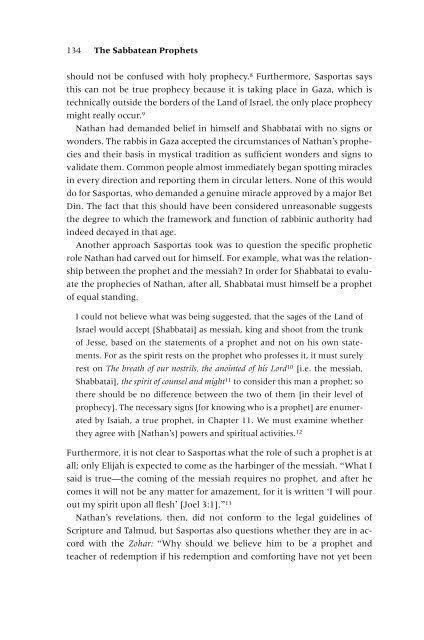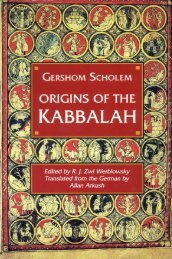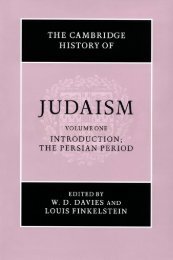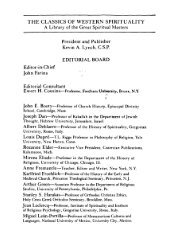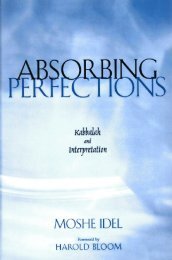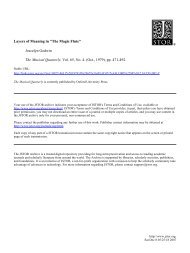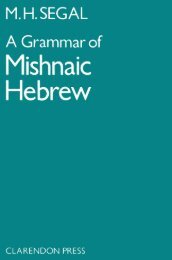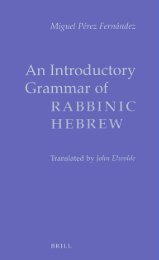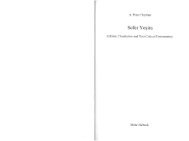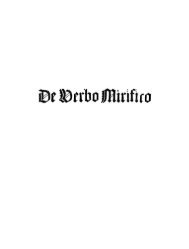You also want an ePaper? Increase the reach of your titles
YUMPU automatically turns print PDFs into web optimized ePapers that Google loves.
134 <strong>The</strong> <strong>Sabbatean</strong> <strong>Prophets</strong><br />
should not be confused with holy prophecy. 8 Furthermore, Sasportas says<br />
this can not be true prophecy because it is taking place in Gaza, which is<br />
technically outside the borders of the Land of Israel, the only place prophecy<br />
might really occur. 9<br />
Nathan had demanded belief in himself and Shabbatai with no signs or<br />
wonders. <strong>The</strong> rabbis in Gaza accepted the circumstances of Nathan’s prophecies<br />
and their basis in mystical tradition as sufficient wonders and signs to<br />
validate them. Common people almost immediately began spotting miracles<br />
in every direction and reporting them in circular letters. None of this would<br />
do for Sasportas, who demanded a genuine miracle approved by a major Bet<br />
Din. <strong>The</strong> fact that this should have been considered unreasonable suggests<br />
the degree to which the framework and function of rabbinic authority had<br />
indeed decayed in that age.<br />
Another approach Sasportas took was to question the specific prophetic<br />
role Nathan had carved out for himself. For example, what was the relationship<br />
between the prophet and the messiah In order for Shabbatai to evaluate<br />
the prophecies of Nathan, after all, Shabbatai must himself be a prophet<br />
of equal standing.<br />
I could not believe what was being suggested, that the sages of the Land of<br />
Israel would accept [Shabbatai] as messiah, king and shoot from the trunk<br />
of Jesse, based on the statements of a prophet and not on his own statements.<br />
For as the spirit rests on the prophet who professes it, it must surely<br />
rest on <strong>The</strong> breath of our nostrils, the anointed of his Lord 10 [i.e. the messiah,<br />
Shabbatai], the spirit of counsel and might 11 to consider this man a prophet; so<br />
there should be no difference between the two of them [in their level of<br />
prophecy]. <strong>The</strong> necessary signs [for knowing who is a prophet] are enumerated<br />
by Isaiah, a true prophet, in Chapter 11. We must examine whether<br />
they agree with [Nathan’s] powers and spiritual activities. 12<br />
Furthermore, it is not clear to Sasportas what the role of such a prophet is at<br />
all; only Elijah is expected to come as the harbinger of the messiah. “What I<br />
said is true—the coming of the messiah requires no prophet, and after he<br />
comes it will not be any matter for amazement, for it is written ‘I will pour<br />
out my spirit upon all flesh’ [Joel 3:1].” 13<br />
Nathan’s revelations, then, did not conform to the legal guidelines of<br />
Scripture and Talmud, but Sasportas also questions whether they are in accord<br />
with the Zohar: “Why should we believe him to be a prophet and<br />
teacher of redemption if his redemption and comforting have not yet been


